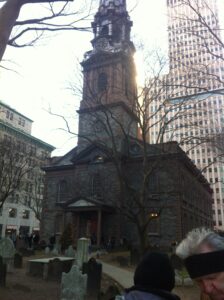by Christine Shook
Christine Shook is an independent historian with over a decade of experience in oral and public history. She earned her master’s in history from California State University, Fullerton in 2010. Her previous positions include Museum Assistant at Mission San Juan Capistrano, Exhibits and Collections Associate at the Tahoe Maritime Museum, and Historian and Assistant Vice President at Wells Fargo’s Family & Business History Center.
September 11, 2001 was an incredibly surreal day. Never a fan of mornings, I awoke late on the Pacific Coast, turned on the TV, and found some sort of devastation unfurling in the east. I didn’t know what had happened. The newscasters had temporarily moved on from the footage showing the planes hitting the World Trade Center and were instead discussing the rescue efforts and fears that the buildings surrounding the towers might collapse. Terrified and utterly confused, I turned to the Internet for answers and first saw the footage of the second plane hitting the towers, and learned about the four planes that had crashed. I spent the next hour bouncing back and forth between the computer and the tv in an attempt to discover what I missed while staying on top of the latest events. It felt like one of those days when the rest of the world should have paused while this thing worked itself out, but that wasn’t the case. I had to go to work. I tamped down the overwhelming feeling of uncertainty I was experiencing, put on my work uniform, and prepared to face the public.
As a recent high school graduate, I worked the closing shift as an attendant at a swanky hotel spa in Dana Point, California. The spa was relatively empty that day. The only exception was a couple from New York who found themselves stranded in Southern California. Unable to fly home or contact any of their friends and family, they came to the spa hoping to find a much needed distraction from the things they could not control. They didn’t stay long.
Later that night, the rest of the spa staff and I spent the hours until closing in one of those drab back rooms that only hotel staff sees, adjusting the antenna on a radio so that we could hear the latest news. As I sat listening to the radio waiting for updates about these attacks on 9/11, my mind transported me to sixty years in the past to the attack on Pearl Harbor. I began to wonder if Americans in 1941 also experienced this atmosphere of angst, remorse, anger, and uncertainty. The events of December 7, 1941 led to years of war and sacrifice. Was that where we were heading?

I was not the only one pillaging the past in search of answers about an uncertain present. Politicians, pundits, pastors — everyone seemed to be making the same comparison to Pearl Harbor, and deriving strength and certainty from the virtue with which America responded to that particular wrong. A common message seemed to be: History has taught us that America is good, so our response will follow suit. Of course, I knew from the stories of family and friends that things were more complicated than that. My grandfather earned medals for his participation in WWII but no one in my family has them today. The physical and psychological wounds with which he returned inspired him to throw those medals into the Atlantic Ocean upon receipt. As a grad student in history, I read Stud Terkel’s “The Good War” and discovered more stories like my grandfather’s that casted doubt on the flawlessness of the conflict and the glorified way in which Americans remember it. The United States’s response to 9/11, the realities of war, and the uncertainty of government actions have similarly affected people in a variety of ways over the past twenty years. While the exact failings of the response to that day vary according to political parties, few think that the United States has handled things with the storied righteousness with which it started.
My own observations and lessons about 9/11 over the past two decades have been heavily influenced by my work as a historian. For the past six-and-a-half years I helped ultra-high-net-worth families examine their historic roots in search of values and lessons that they could apply to today — using the past to guide future choices and investments. When I first began this work, the message we offered clients was always one of hope: your family not only survived X, it eventually thrived financially. There’s value to that narrative of resilience, of course, but also a danger in overconfidence. In the past few years, I’ve noticed a promising trend where family members — especially those from younger generations — want to know more and more about the hard and uncomfortable truths from their past. They appear to recognize their ancestors as flawed people with cautionary tales that accompany the celebratory.
I can only hope that this willingness to look at cherished personal histories with a critical eye will expand to include the national narrative. Perhaps the next time America faces another crisis like 9/11, the stories of people like my grandfather, who rejected a jingoistic narrative, won’t be overlooked in order to provide quick answers to the question: what now?